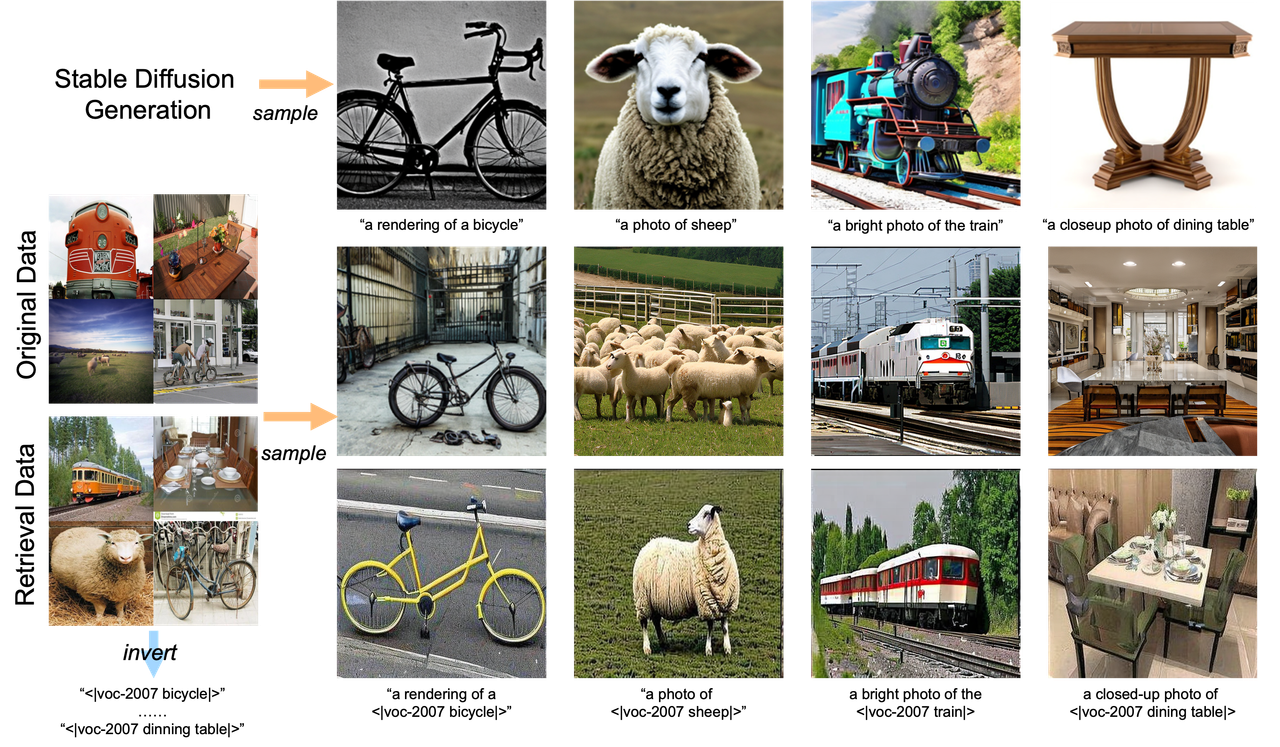Machine learning (ML) community has successfully utilized datasets, though their creation often demands substantial time and resources. Despite this, there's a lack of efficient, open data engineering tools to streamline these processes, leading to increased costs. This prompts an exploration into the potential benefits of generative data, a topic investigated in this paper.
With the repo, you can easily:
(1) sample images from generative models;
(2) pack images for various evaluations;
(3) run CLER score/Elevater evaluations;
(4) analyze images with other metrics (FID, CLIP score, proxy-A distance etc.);
Large pre-trained generative models have made remarkable progress in generating realistic and diverse images. This ability opens up the possibility of utilizing large pre-trained generative models as efficient data generators to enhance visual recognition. In this work, we aim to rigorously benchmark and analyze the effect of generative images, with an emphasis on comparative studies among different paradigms leveraging external data (i.e. generative vs. retrieval vs. original). Our contributions include:
(1) Benchmarking with wide coverage: We construct GenBench, a comprehensive benchmark consisting of 22 datasets with 2548 categories to cover a diverse range of visual recognition tasks to evaluate the benefits of generative data.
(2) New metric tailored for recognition: Existing metrics in generative models (\eg, FID and CLIP score) have no strong correlation for the downstream recognition performance. Here we propose a training-free metric, CLER score, to efficiently indicate the effectiveness of generative data for recognition performance before actually training on the downstream tasks.
(3) New reference baselines: Leveraging external training data includes retrieval-based methods. We compare generative data with retrieved data from the same external pool to highlight the unique characteristics of generative data.
(4) Investigating external knowledge injection in generative models: We fine-tune special token embeddings for each category in a dataset by injecting retrieval and original data via Textual Inversion. This approach leads to improved performance across 17 datasets, with a notable exception in the case of low-resolution reference images.
Overall, our comprehensive benchmark, in-depth analysis, and proposed techniques highlight the opportunities of generative data for visual recognition, while also identifying critical challenges for future research.
<style> .centered { display: flex; justify-content: center; align-items: center; } </style>Right: The average results using different external data sources on the 22 datasets, along with sample images for different categories, are shown on the right.
- Python 3.7+
- Loguru
- Wandb
- Vision_Benchmark (https://github.com/Computer-Vision-in-the-Wild/Vision_Benchmark)
This project provides a flexible pipeline for sampling images from generative models, packing images for evaluation, and running CLER score evaluations along with various other evaluation methods. The script
pipeline.pyguides the entire process.
You can run the pipeline.py with different options. Here are the options and their usage:
-
configure dataset meta info:
--option configureUse this option to setup the dataset meta information. -
prepare retrieval/original images for textual inversion reference:
--option textual_inversion_prepareThis will prepare retrieval or original images for textual inversion reference. -
sampling images from generative models (stable diffusion, or with injected token embeddings):
--option sample_imagesThis option will sample images from the generative models. You can choose to sample images from stable diffusion or with injected token embeddings. -
pack generated/retrieval images for evaluation:
--option pack_generatedor--option pack_retrievalUse these options to pack the generated or retrieval images for evaluation. -
run evaluation with Elevater:
--option elevatorThis will run the evaluation with Elevater toolkit. -
run zeroshot evaluation with CLER Score and FID metric:
--option zeroshot_metricThis will run a zeroshot evaluation using CLER Score and FID metric. -
calculate proxy_a_instance:
--option proxy_distanceThis will calculate the proxy_a_instance.
Please note that for most of these options, additional arguments may be needed. Refer to the pipeline.py script for the full list of arguments.
The above commands can also be combined to form a pipeline execution.
Here is an example command to run the pipeline.py script:
python pipeline.py --option configure,sample_images,pack_generated,elevator,zeroshot_metric,proxy_distance --dataset_name hateful-memes --language_enc lang_enc --output_dir ./work_dirsThis command will configure the dataset meta info, sample images, pack the generated images, run evaluation with Elevater, run zeroshot evaluation, and calculate the proxy_a_instance. The dataset used is hateful-memes and the generation model is stable-diffusion-2.1 in default. The output directory is set to ./work_dirs.
If you have any questions or issues, please open an issue in this repository or contact drluodian@gmail.com for help.



